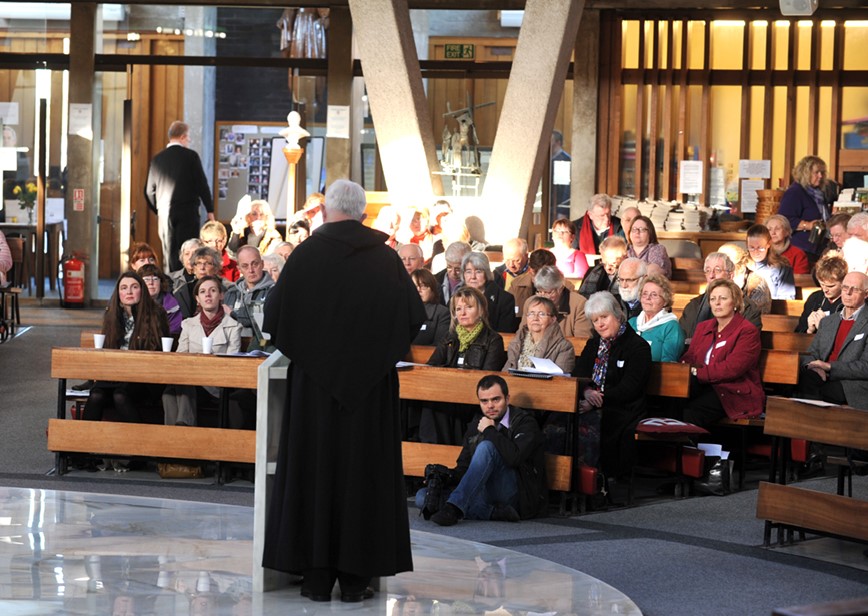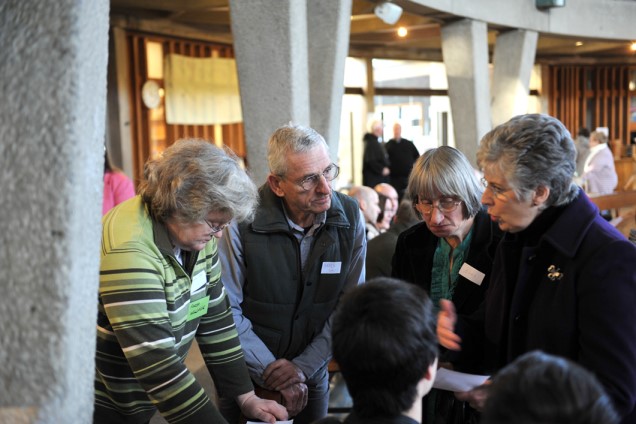The Lord does not repay us according to our faults
Posted by adminFeb 10
Yesterday morning these words from Psalm 102 (103) struck me forcibly: they echoed various reflections I had.
The Lord is compassion and love,
slow to anger and rich in mercy.
His wrath will come to an end;
he will not be angry for ever.
He does not treat us according to our sins
nor repay us according to our faults.
The psalmist takes for granted that we have sins and faults and that God who is compassion, love, slow to anger and rich in mercy will forgive us. Why did the Psalmist think like that? He must have had some special experience of God’s mercy and forgiveness, how, I do not know. He wrote without knowing of the redemption of all humankind and of the whole cosmos through Jesus in his loving death and glorious resurrection
Yesterday, 6 February 2013 I had received a particular daily encouragement to live out my Christian life as a builder of peace. This means to try to spread peace with the particular people that I am in touch with during the day. There is a beautiful blessing given in various liturgical ceremonies taken from St. Paul’s letter to the Philippians 4: 7. May the peace of God that is beyond all understanding keep your hearts and minds in the knowledge and love of God and of his Son our Lord Jesus Christ.
Peace from God is beyond all understanding. Nobody can therefore discover true peace, God’s peace, by his or her understanding! We cannot “think it up” or “create peace by our own efforts”. It is beyond understanding, beyond human thinking and is a gift from God. Nobody can manufacture it: nobody can take it away from me.
Loving our brothers and sisters is the key to this peace! It is hard to know how to love them properly and how much to give in to them, because as I get older I can see the selfishness of the old man of sin coming out in various ways, often subtle in my case. It is often not so subtle in others.
Last Sunday’s Gospel story is really most interesting Luke 4: 20-31.
When they heard this (Jesus’ teaching), all in the synagogue were filled with rage. They got up, drove him out of the town, and led him to the brow of the hill on which their town was built, so that they might hurl him off the cliff. But he passed through the midst of them on went on his way. (Luke 4: 28-30)
When those Nazarenes wanted to kill Jesus and took him to the top of the cliff to throw him off, I am sure that Jesus – who had lived among them throughout most of his hidden life, and there were no more than a 100 people in the whole hamlet of Nazareth – would not want them all to “go to hell” so to speak because they wanted to kill him. He came to redeem everyone, including them. In the gospel story it says he just “slipped through them” and escaped. It was not the right moment for him to die as his time had not come. Later some of those people from Nazareth, and some were his relatives, became pillars of the first Church in Jerusalem. So later they came to believe and became disciples of Jesus and I am sure they found that peace which passes understanding.
We distribute food parcels to those who are poor and in need. Last Friday when I was particularly busy moving chairs and getting ready for a big conference on Saturday, two rather destitute people came to the door, a young lady and a young man. Seeing me struggling with chairs they immediately came to help: – a good instinct. They got their food parcels, but then pointed out in a strong way that the food was no good to them as they had no electricity with which to cook the food, and they had no place to go anyway, unless we could provide money to buy electricity on their key.
Bishop Michael Cambell of Lancaster diocese addressing our conference on Saturday 2 February 2013
I was busy on that Friday evening, 1st February, pre-occupied with the four guests coming to stay in our house and their evening meal, and still with a mountain of things to do including moving chairs. So I let the two people in need be, and continued my work; but a little niggle in my heart told me: “Jonathan, you must listen and respond to their needs”. So I stopped, talked to them and discovered they needed £8. The SVP (St. Vincent de Paul Society) member gave me permission to use their money and I decided to stop doing what I was doing to serve Jesus in these two poor people.
Small group discussion at the Conference 2 February 2013
It meant a walk to the shop. It was a pleasant breather for me, and gave me a chance to “spend time” with these two needy young people and talk to them. Apart from some moans about how harsh life was from the young man, we had a pleasant walk to the shop: we got the electricity, and after a very cordial and friendly good night I returned. The young girl was particularly friendly and courteous. It was as though we had a moment of peace.
I had to overcome my hardness of heart in their regard, and the young and needy destitute pair had to learn how to overcome their own negativity which they did.
The Lord is compassion and love,
slow to anger and rich in mercy.
His wrath will come to an end;
he will not be angry for ever.
He does not treat us according to our sins
nor repay us according to our faults.
Imagine my surprise when I was told on Tuesday that the young girl “inadvertently” had taken a cocktail of drugs and had died the previous day. I was so glad that I had not been stubborn with those two young people and helped them the previous Friday! I am sure there was a sense of mutual respect and understanding, even of love while we walked to the shop that night. Furthermore we had all gone beyond the faults and sins all of us have. I hope that the moment of peace I had felt, especially with the young girl who died was something she too felt.
I am sure God will not treat that young lady according to her sins nor repay her according to her faults, and I am praying for her speedily to enter the fullness of life in heaven where there is true and lasting peace



No comments